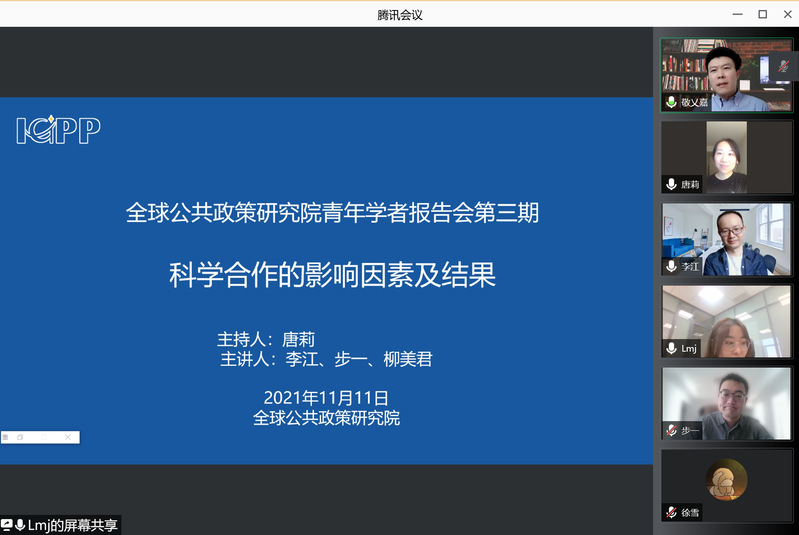Events



On 11th November, 2021, the 3rd Young Scholar Workshop in the Institute for Global Public Policy (IGPP) of Fudan University was held online. The topic of this workshop is related to the influential factors of scientific collaboration and its consequences. The speakers of this workshop included Jiang Li, Professor of Nanjing University, Dr. Yi Bu, Assistant Professor of Peking University, and Dr. Meijun Liu, Assistant Professor of the IGPP. The workshop was moderated by Professor Li Tang of School of International Relations & Public Affairs. Over 90 participants joined in this virtual event.

Professor Jiang Li lectured on “scientific mobility and collaboration”. Under the background of brain drain and talents circulation, he introduced his recent research on the impact of scientists’ mobility on the stability of scientific collaboration. The results of regression analyses suggest that the mobility frequencies are positively related to the stability of scientific collaboration. The findings can be explained from diverse perspectives. Scientific collaboration is heavily determined by the geographical distance between researchers and their co-authors that can be reshaped through scientific mobility. On the other hand, barriers concerning social interaction hinder researchers from seeking new collaborators. Professor Jiang Li discussed with the audience about the identification of causality and the indicators used to measure the stability of scientific collaboration.
Dr. Yi Bu lectured on “the structural characteristics of scientific collaboration networks”. He proposed three hypotheses about homophily, transitivity, and preferential attachment for scientific collaboration. Based on the regression results, he found that a unit of the increase in the number of publications where the author is not the first author increased the possibility of generating a new collaboration attachment; the probability of single-gender collaboration was higher than that of mixed-gender collaboration; the probability that a researcher collaborated with his/her co-authors’ coauthors was higher than that a researcher collaborated with those who have not collaboration connections with the researcher’s coauthors.
Dr. Meijun Liu lectured on “team freshness and team innovation”. She presented two recent studies to discuss the effect of team freshness on team performance. In the study of the relationship between team freshness and scientific impacts, she found that (1) team freshness in scientific teams has been increasing in the past half-century; (2) there exists an inverted-U-shaped association between team freshness and papers’ citations in all the disciplines and in different periods; (3) the inverted-U-shaped relationship between team freshness and papers’ citations is only found in small teams, while, in large teams, team freshness is significantly positively related to papers’ citations. In the study of team freshness and scientific novelty, her research suggested that before the COVID-19 pandemic, team freshness was negatively related to scientific novelty, while the relationship turned positive during the pandemic period. Dr. Meijun Liu discussed with the audience about the measures of scientific novelty and the marginal effect of team freshness.